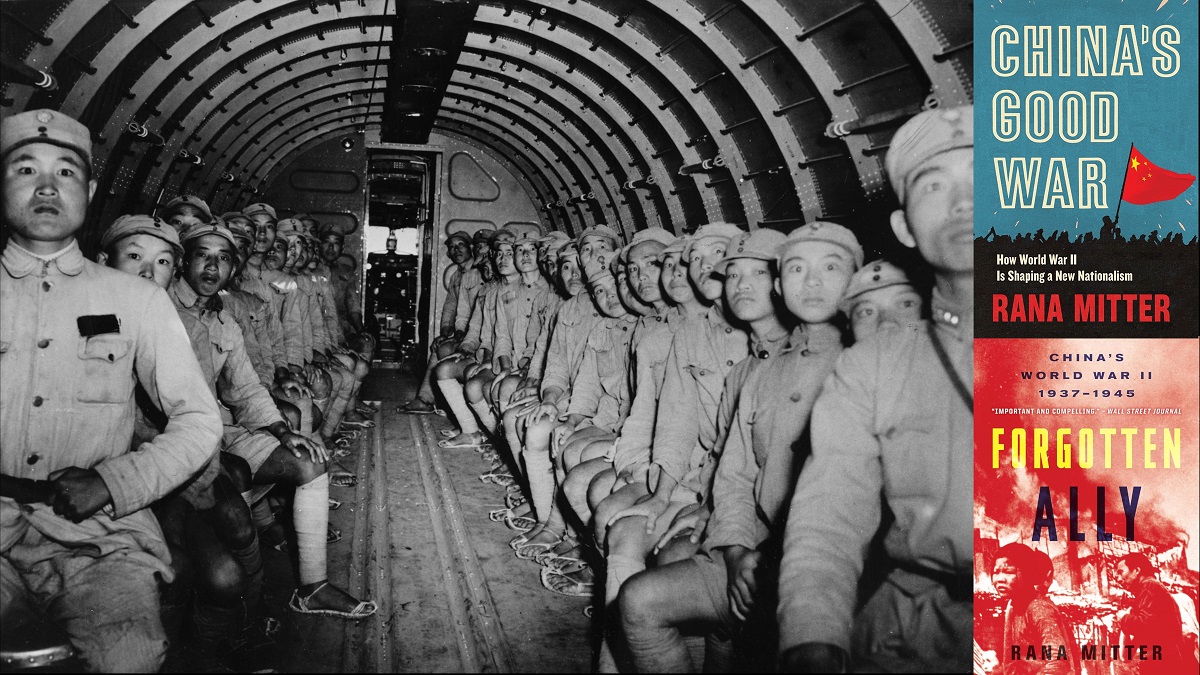
It’s time for another episode of On Writing with Michael Neiberg. For this conversation, Michael is joined by Rana Mitter, author of China’s Good War: How World War II is Shaping a New Nationalism. Their discussion took place in the heart of London on a warm June afternoon at the British Academy, complete with all the background noises of the bustling city. Rana explains how China is shaping the modern narrative and memory through the reinvention of its role in World War II. An often overlooked theater, the Chinese government has taken liberties with its complicated response to the Japanese invasion and rewritten it as a fierce resistance and heroic battle against fascism.
It was only later that I came to understand that actually many of these events, which seem in some ways quite distant decades and decades ago, actually have a resonance in interpreting China in the present day.
Podcast: Download
Subscribe: Apple Podcasts | Spotify | Amazon Music | Android | Pandora | iHeartRadio | Blubrry | Podchaser | Podcast Index | TuneIn | Deezer | Youtube Music | RSS | Subscribe to A Better Peace: The War Room Podcast
Rana Mitter OBE FBA is a British historian and political scientist who specializes in the history of the Republic of China. He is ST Lee Chair in U.S.-Asia Relations at the Harvard Kennedy School. Until 2023 he was Professor of the History and Politics of Modern China at the Department of Politics and International Relations at the University of Oxford, formerly director of Oxford’s China Centre, and a Fellow and Vice-Master of St Cross College. He is the author of several books, including Forgotten Ally: China’s World War II (2013) which won the 2014 RUSI/Duke of Westminster’s Medal for Military Literature, and was named a Book of the Year in the Financial Times and Economist. His latest book is China’s Good War: How World War II is Shaping a New Nationalism (Harvard, 2020).
Michael Neiberg is the Chair of War Studies at the U.S. Army War College.
The views expressed in this presentation are those of the speakers and do not necessarily reflect those of the U.S. Army War College, U.S. Army, or Department of Defense.
Photo Description: The interior of the DC-3 with its complement of Chinese soldiers enroute to India on their task missions being transported by United States Army Air force flyers.
Photo Credit: Photographer unknown, U.S. Army Air Forces, Washington, D.C. via Library of Congress





In order for China to take on the U.S./the West — today and in coming years — China may be thinking that it might be best — first and foremost — to deal with certain of its own — historical — internal divides, for example,
a. The divide between those who might be called cultural conservatives (i.e., those who support traditional Confucian values) and those who might be called leftists (to wit: those who support the current Chinese communist/socialist system) and
b. The divide between those who were/are called “nationalists” (those who support Chiang Kai-shek and his followers) and those who were/are called “communists” (those who support Mao and his followers).
As to this such thought — and as per my item “a” above for example — consider (a) the following quoted item and (b) the rationale addressed in the final sentence thereof:
“This may, in fact, be the missing explanatory element. Ideologies regularly define themselves against a perceived ‘other,’ and in this case there was quite plausibly a common and powerful ‘other’ that both cultural conservatism and political leftism defined themselves against. This also explains why leftists have, since the 1990s, become considerably more tolerant, even accepting, of cultural conservatism than they were for virtually the entire 20th century. The need to accumulate additional ideological resources to combat a perceived Western liberal ‘other’ is a powerful one, and it seems perfectly possible that this could have overridden whatever historical antagonism, or even substantive disagreement, existed between the two positions.” (See the Foreign Policy article “What it Means to Be ‘Liberal’ or ‘Conservative’ in China: Putting the Country’s Most Significant Political Divide in Context,” by Taisu Zhang.)
Question — Based on the Above:
Should China’s rewriting and/or reconsidering of World War II history, likewise, be considered from the perspective of/re: the rationale of (a) trying to overcome historical antagonisms which might (b) get in the way of taking on the U.S./the West?
As to my thoughts in my first two comments above, consider this quote from the Los Angles Review of Books article “The Battlefield of Memory: On Rana Mitter’s ‘China’s Good War,’ “December 15, 2020 by Yangyang Cheng:
“Rehabilitating the Nationalists, Mitter explains, helps with national cohesion and serves as an olive branch to Taiwan. As China sheds the Mao-era image of a revolutionary state and recasts itself as a responsible stakeholder, its claim of being ‘present at the creation’ of the postwar order also relies on the legitimacy of the Nationalist government at the time.”
Britannica suggest that nationalism is an ideology:
“Nationalism is an ideology that emphasizes loyalty, devotion, or allegiance to a nation or nation-state and holds that such obligations outweigh other individual or group interests.”
Question: If “ideologies regularly define themselves against a perceived ‘other’ ” (see the second sentence of the quoted item in my first comment above), then, much like Chinese cultural conservatism, and much like Chinese political leftism, is not Chinese nationalism (however achieved) — likewise and also — a means/method by which the Chinese can distinguish themselves from/define themselves against a perceived Western liberal ‘other’ ?
(Or does China’s “allies” status during World War II undermine this such “othering” effort?)
Reviewing the information that I provide above, one gets the feeling that the threat posed to China (et. al.?) — for example by the liberal international order — THIS is what causes China (etc.?) to feel the need to deal with — in some kind of positive and/or unifying fashion — what might be called a nation’s “strange bedfellows.” (In the China example, in my earlier comments above, see such “strange bedfellows” as Chinese cultural conservatives, Chinese political leftists and Chinese nationalists.)
To get a better feel for the “nature” of this such perceived threat — suggested to be posed to many/most states and societies of the world by the liberal international order — consider the following:
“Yet, as noted by scholars across different theoretical traditions, the liberal international order is not simply a normatively thin order that regulates in mutually beneficial ways relations among states through value-free rules, institutions, and markets. It is rather an ideologically thick order (Allan, Vucetic, and Hopf 2018; Jahn 2019; Cooley and Nexon 2020), infused with a complex set of ideas, norms and principles, whose main institutions, actors, and practices seek to transform states and their societies both beyond and within the West.” (See the article “Civilizationism and the Ideological Contestation of the Liberal International Order” by Gregorio Bettiza, Derek Bolton and David Lewis in Interntional Studies Review, Volume 25, Issue 2, June 2023.)
Thus, is it so as to deal effectively with this such “transformational threat” — discussed in my quoted immediately above — that we should:
a. Understand such things as China’s new “Global Civilizational Initiative”? (See, for example, the June 01, 2023 “The Diplomat” article “The Trouble With China’s Global Civilization Initiative” by R. Evan Ellis.) And:
b. Such things as China’s efforts — re: its New Nationalism — to use to its activities in World War II to its best benefit?